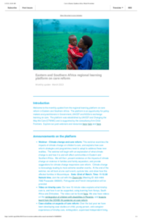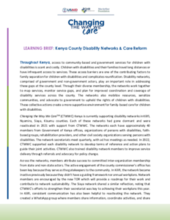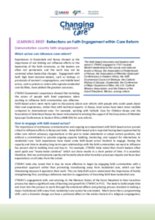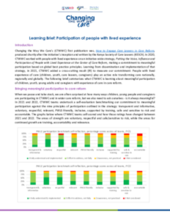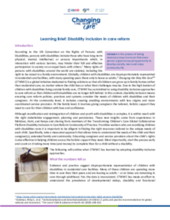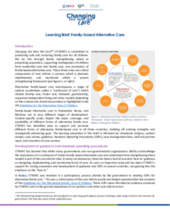This country page features an interactive, icon-based data dashboard providing a national-level overview of the status of children’s care and care reform efforts (a “Country Care Snapshot”), along with a list of resources and organizations in the country.
demographic_data
childrens_living_arrangement
children_living_without_bio
adoption
social_work_force
key_stakeholders
Key Stakeholders
Add New DataOther Relevant Reforms
Add New Datadrivers_of_institutionalisation
Drivers of Institutionaliziation
Add New Datakey_research_and_information
Key Data Sources
Add New DataChildren's Act, 2022 (Kenya)
Prevalence and number of children living in institutional care: global, regional, and country estimates
Social Protection and Disability in Kenya
Kenya Social Protection Sector Review
Country Care Review: Kenya
Child Developmental Disabilities, Caregivers’ Role in Kenya and Its Implications on Global Migration
Research findings on Alternative care system in Kenya for children without parental care
Charitable Children Institutions in Kenya: Factors Influencing Institutionalization of Children
Acknowledgements
Data for this country care snapshot was contributed by consultants with Maestral International.
Displaying 101 - 110 of 448
Families Together is a parenting curriculum for families who have a child reintegrating into the home. The program is an adapted version of the Skillful Parenting Programme, designed and delivered in Kenya by Investing in Children and their Societies (ICS).
This is the monthly update of the Eastern and Southern Africa Regional Learning Platform published in March 2023.
This learning brief was developed as part of the CTWWC 2021 annual report and shares learning from Kenya and Moldova. It is intended to share what the initiative has learned about gathering data and helping governments and their partners to use it for strategizing care reform.
This learning brief shares learning from Kenya around the barriers that contribute to family separation for children with disabilities and how disability networks are working to create a supportive environment for family-based care for these children.
This learning brief was developed as part of the CTWWC 2021 annual report and shares learning from demonstration countries on how to engage and bring faith actors into care reform.
This learning brief was developed as part of the CTWWC 2021 annual report and shares learning from several contexts and is intended to share learning on how family strengthening, reunification, case management and workforce strengthening can be integrated in care reform.
This learning brief was developed as part of the CTWWC 2022 annual report and shares learning from across different contexts. It is intended to showcase how the transition of care services is happening and how it can be supported.
This learning brief was developed as part of the CTWWC 2022 annual report and shares learning from Kenya, Guatemala and Moldova. It is intended to help other practitioners understand how to bring meaningful participation of people with lived experience into care reform. By people with lived experience CTWWC considers children and youth, care leavers, parents and other care givers who are experiencing the care system in their context.
This learning brief was developed as part of the CTWWC 2022 annual report and shares learning from Kenya and beyond. It is intended to help other practitioners understand how disability inclusion happens by sharing examples of practice.
This learning brief was developed as part of Changing the Way We Care's 2022 annual report and shares learning on family-based alternative care from Guatemala, Moldova, India and Kenya and links the reader to additional CTWWC resources on the topic.

